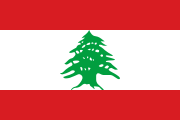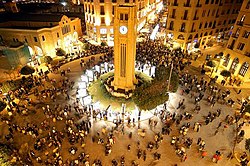Portal:Lebanon
The Lebanon PortalA view of Byblos, Lebanon
 Lebanon (/ˈlɛbənɒn, -nən/ LEB-ə-non, -nən; Arabic: لُبْنَان, romanized: Lubnān, local pronunciation: [lɪbˈneːn]), officially the Republic of Lebanon, is a country in the Levant region of West Asia, bordered by Syria to the north and east, Israel to the south, and the Mediterranean Sea to the west; Cyprus lies a short distance from the country's coastline. It is at the crossroads of the Mediterranean Basin and the Arabian Peninsula. Lebanon has a population of more than five million and an area of 10,452 square kilometres (4,036 sq mi). Beirut is the country's capital and largest city. Human habitation in Lebanon dates to 5000 BC. From 3200 to 539 BC, it was part of Phoenicia, a maritime empire that stretched the Mediterranean Basin. In 64 BC, the region became part of the Roman Empire, and later the Byzantine Empire. After the 7th century, it came under the rule of different caliphates, including the Rashidun, Umayyad and Abbasid Caliphate. The 11th century saw the establishment of Crusader states, which fell to the Ayyubids and the Mamluks, and eventually the Ottomans. Under Ottoman ruler Abdulmejid I, the first Lebanese proto-state, the Mount Lebanon Mutasarrifate, was established in the 19th century as a home for Maronite Christians, in the Tanzimat period. Lebanon is a developing country, ranked 112th on the Human Development Index. It has been classified as an upper-middle-income state. The Lebanese liquidity crisis, coupled with nationwide corruption and disasters such as the 2020 Beirut explosion, precipitated the collapse of Lebanon's currency and fomented political instability, widespread resource shortages, and high unemployment and poverty. The World Bank has defined Lebanon's economic crisis as one of the world's worst since the 19th century. Despite the country's small size, Lebanese culture is renowned both in the Arab world and globally, powered primarily by the Lebanese diaspora. Lebanon is a founding member of the United Nations and of the Arab League, and is a member of the Non-Aligned Movement, the Organization of Islamic Cooperation, the Organisation internationale de la Francophonie, and the Group of 77. (Full article...) This is a Featured article, one of the best articles Wikipedia has to offer.
The law school of Berytus (also known as the law school of Beirut) was a center for the study of Roman law in classical antiquity located in Berytus (modern-day Beirut, Lebanon). It flourished under the patronage of the Roman emperors and functioned as the Roman Empire's preeminent center of jurisprudence until its destruction in AD 551. The law schools of the Roman Empire established organized repositories of imperial constitutions and institutionalized the study and practice of jurisprudence to relieve the busy imperial courts. The archiving of imperial constitutions facilitated the task of jurists in referring to legal precedents. The origins of the law school of Beirut are obscure, but probably it was under Augustus in the first century. The earliest written mention of the school dates to 238–239 AD, when its reputation had already been established. The school attracted young, affluent Roman citizens, and its professors made major contributions to the Codex of Justinian. The school achieved such wide recognition throughout the Empire that Beirut was known as the "Mother of Laws". Beirut was one of the few schools allowed to continue teaching jurisprudence when Byzantine emperor Justinian I shut down other provincial law schools. The course of study at Beirut lasted for five years and consisted in the revision and analysis of classical legal texts and imperial constitutions, in addition to case discussions. Justinian took a personal interest in the teaching process, charging the bishop of Beirut, the governor of Phoenicia Maritima and the teachers with discipline maintenance in the school. (Full article...) Did you know (auto-generated) -
TopicsRelated portalsReligions in Lebanon Arab states Other countries This is a Good article, an article that meets a core set of editorial standards.
 Lebanon sent a delegation to compete at the 2010 Winter Olympics in Vancouver, British Columbia, Canada from 12–28 February 2010. This was Lebanon's 15th appearance at a Winter Olympic Games. The Lebanese team consisted of three alpine skiers. Lebanon has never won a medal at a Winter Olympics, and their best performance in Vancouver was 37th in the women's super-G by Chirine Njeim; Ghassan Achi failed to post a result in either of his races, and Jacky Chamoun finished 54th in her only race. (Full article...) General imagesThe following are images from various Lebanon-related articles on Wikipedia.
CategoriesAssociated WikimediaThe following Wikimedia Foundation sister projects provide more on this subject:
SourcesDiscover Wikipedia using portals |
























































